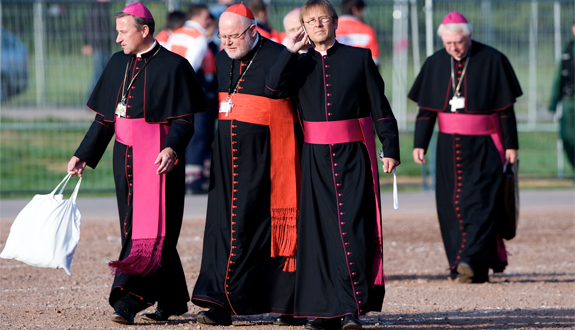

The 21st-century Church owes a lot to 20th-century German Catholicism: for its generosity to Catholics in the Third World; for the witness of martyrs like Alfred Delp, Bernhard Lichtenberg, and Edith Stein; for its contributions to Biblical studies, systematic and moral theology, liturgical renewal, and Catholic social doctrine, through which German Catholicism played a leading role in Vatican II’s efforts to renew Catholic witness for the third millennium. At the Council, more than the Rhine flowed into the Tiber; let’s not forget the Seine, the Meuse, the Potomac, and the Vistula. But the Rhine’s flow was strong.
Which simply intensifies the shock on reading the German bishops’ report to the Vatican in preparation for this coming October’s synod. One of my correspondents deemed it a de facto declaration of schism. I read it as an unintentional cri du coeur: a confession of catechetical disaster and pastoral failure on a nationwide scale, to which the German episcopate has no response save to urge others down the path that has led Catholicism in Germany into profound incoherence.
When one tries to discuss this catastrophe with senior German churchmen, one rarely finds, these days, a sobered openness, born of the recognition that something has gone terribly wrong and that another approach to evangelization and catechesis must be found—an “All-In Catholicism” rooted in the joy of the Gospel preached and lived in its full integrity. Rather, what you often find is a stubborn doubling-down. “You don’t understand our situation” is the antiphon, typically spoken with some vehemence.
Yet is it really the case that we obtuse non-Germans don’t understand? The statistics on German Catholic practice—more accurately, the lack thereof—are not pontifical secrets. Those statistics are embodied by what visitors observe in German cities on Sunday: largely empty churches. Now comes this report for the synod, which suggests that, on matters of marriage, the family, the morality of human love, and the things that make for genuine happiness, German Catholic thinking is virtually indistinguishable from that of non-believers.
And still the German episcopate suggests that more dumbing down of Catholic doctrine and practice is the answer, now on a global scale. It’s quite remarkable. And it will certainly be remarked upon, and not favorably, in Rome in October.
In October 2001, I had an engaging, two-hour conversation with Cardinal Karl Lehmann, now one of the grand old men of the German hierarchy. We discussed the crisis of belief throughout Europe (and Europe’s related demographic meltdown) at length. Then the cardinal offered me a copy of his newest book, “Now Is the Time to Think of God.” I must say I found the title … striking. I knew he intended it as a challenge to the regnant secularism of the time, but you had to wonder: What else had this distinguished scholar, and his colleagues at the higher altitudes of German theology, been speaking about, these many years?
To make a very long story short, they had often been speaking-about-speaking-about-God: that is, they’d been chasing their tails in trying to respond to the crisis of belief in late modernity. And in doing so, they’d gotten stuck inside what Polish philosopher Wojciech Chudy, an intellectual great-grandson of John Paul II, called the post-Kantian “trap of reflection:” thinking-about-thinking-about-thinking, rather than thinking about reality—in this case, the Gospel and its truths. Less elegantly, I’d describe Chudy’s “trap of reflection” as the quicksand pit of a subjectivism become self-absorption, from which it’s hard to extract oneself and answer the Master’s call, “Come, follow me.”
The German Catholic crisis is not primarily institutional; the Catholic Church is Germany’s second-largest employer and its institutions are robust. The crisis is one of faith. German Catholicism is in crisis because German Catholics have not embraced the Lord Jesus and his Gospel with passion, conviction and joy, and are seeking their happiness elsewhere. That’s sad; that‘s tragic; that’s dispiriting.
But it’s also nothing to be commended as a model for others, except as a cautionary tale about the effects of surrendering to the spirit of the age.
If you value the news and views Catholic World Report provides, please consider donating to support our efforts. Your contribution will help us continue to make CWR available to all readers worldwide for free, without a subscription. Thank you for your generosity!
Click here for more information on donating to CWR. Click here to sign up for our newsletter.


